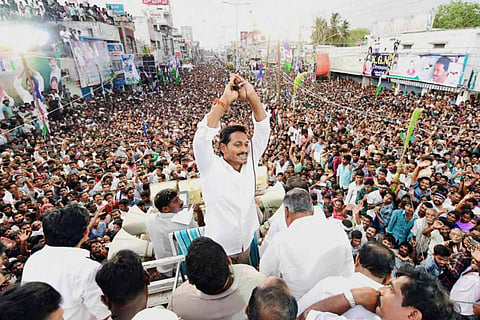

Several of the welfare schemes announced by Andhra Pradesh Chief Minister Jagan Mohan Reddy in the last 18 months since coming to power, have been centered around the SC, ST and BC communities in the state. In yet another push in that direction, 56 chairpersons, 672 directors were sworn in for 56 Backward Classes (BC) corporations making Andhra Pradesh the first ever state to do so. Speaking at the function, Jagan said that his government had turned ‘Backward Classes to Backbone Classes’.
The promise to form BC commissions was made during Jagan’s 3648-kilometre long padayatra before the elections. In February 2019, in West Godavari district’s Eluru, Jagan had announced that if his party comes to power, he will spend Rs 15,000 crores per annum for the welfare of the BC community and had released a ‘BC Declaration’ document, detailing the sops promised.
The BCs constitute the majority population in Andhra Pradesh, forming 49.55% of the total state’s population. There are 139 sub-castes within the BC community and have been categorised into A, B, C, D and E sub-sections. Castes with more than 30,000 people have been given a separate commission as per the newly-announced policy. The blueprint to focus more on the community can make for good policy and politics, if implemented as per the plan.
In India, till date, there is one commission to cater to the needs of all Backward Classes with each state customising it as per their caste composition. With Jagan government’s decentralised approach, experts believe disbursement of funds, schemes could become faster and more efficient. While caution needs to be exercised to ensure that multiple touch-points do not lead to a porous and tedious system, with multiple overlaps, eventually resulting in chaos, in principle the policy is being hailed as a move to instil confidence in the community.
By addressing the social, economic backwardness of close to half of the state population, the growth story too can be more inclusive in a state that is still coming to terms with the bifurcation.
Women too have been given representation in top levels in the commissions with 50% reservation kept aside. The BC corporation saw 29 chairperson posts allotted to women, while 336 of 672 posts directors under the BC corporation are also women.
The BC Declaration announced a slew of perks for the community including school fees reimbursements, financial assistance of Rs 18,750 to women between 45-60 years to start small business, health care, pensions for senior citizens. Tracking of these welfare schemes will also be easier with accountabilities fixed with each commissioner to ensure that benefits reach the intended.
Soon after coming to power, the Andhra cabinet approved 50% reservation for SCs, STs, BCs and minorities in government-run corporations, trusts, societies and boards. Another key policy change was the 50% appointment of SCs, STs and OBCs temple committees across the state. In October, the Andhra government had announced a special industrial policy for SC/ST entrepreneurs with benefits like reservations in land allotment in industrial zones, investment subsidies, power interest subsidies and other incentives.
Andhra Pradesh’s politics for many decades was centred around Kapus and Kammas. Not enough efforts have been made to focus on the largest segment of the state population which can actually sway the tide. Ahead of the 2019 elections in the state, the State Backward Classes Federation Welfare Association had alleged that there was no adequate representation of the community that formed 50% of the population. And while they said that at the time they are not forming a political party to push their cause, they will throw their weight behind anyone who will assure them of a fair participatory role in governance.
While the government says the slew of benefits announced is not a political move, it is loaded with political benefits for the ruling YSRCP that already made a political statement by making three people from the SC, ST and BC communities as Deputy Chief Ministers.
The Chandra Babu Naidu government had formed separate commissions for Brahmins and Kapus which further irked the BC Associations. Realising the potential of gaining the BC votes, TDP attempted corrective measures in November 2020 when the party appointed senior leaders to their committees from the community from two districts--Vizianagaram and Srikakulam. Till the 2014 elections, the northern Andhra region had been with the TDP but in 2019, the YSRCP won 17 out of 19 Assembly seats from these two districts.
With this move, the YSRCP is not just eating away at the TDP and any left-over Congress vote bank but also working in the direction of making it difficult for BJP to establish in the state. The BJP’s trademark in expanding its roots have been consolidation of the OBCs. While the saffron party eyes the south, Jagan’s move to woo the BCs will help him stay a step ahead. While Jagan’s YSRCP enjoys the support of Kapus and minorities in the state, the BC vote bank will help them concretise their position for the 2024 elections.